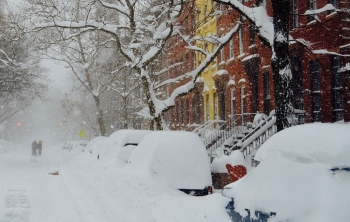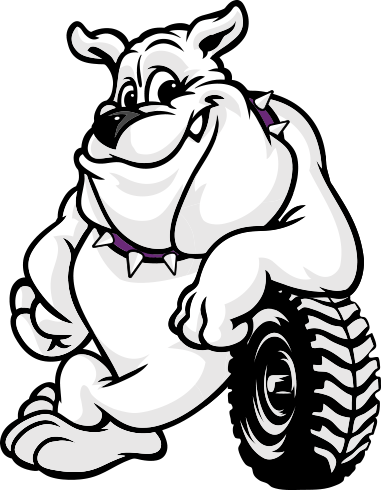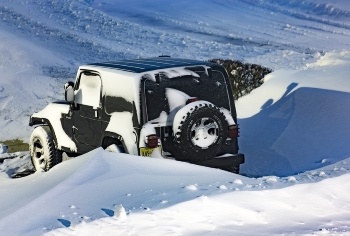If your car won't start on a cold morning, it's usually due to one of these 4 issues:
- Your car battery is frozen, dying or dead
- Your engine oil is low and/or cold
- Your alternator belt is cracked
- Your fuel line is frozen
Cause #1 - Your Car Battery is Frozen, Dying or Dead
Frozen Car Battery
When it’s cold outside, the liquid inside your car battery can freeze if your battery isn’t fully charged. Whatever the cause of your frozen battery (an old battery, a short in your electrical system, or a faulty alternator), a frozen car battery is a day-stopper.
If you’re thinking about jump-starting your car, first make sure your car battery isn’t frozen. Attempting to jump-start a frozen battery can cause the battery to explode, creating serious danger for you and ruining your car battery for good.
Signs of a Frozen Car Battery:
- Bulging anywhere on the battery, especially on the sides
- Cracks on the battery case
- No liquid noise when you move the flooded battery cell
What to Do If Your Car Battery is Frozen:
A fully discharged battery, which can occur if just one component of your battery is damaged or isn’t performing optimally, freezes at around 32 degrees Fahrenheit. If you observe any signs of a frozen battery, DO NOT jump-start your car- the frozen battery may explode.
It’s tempting to try to revive your frozen battery. DIY methods of warming up and thawing out your battery can be dangerous and ultimately ineffective, leaving you with a risky fire hazard you’ll have to replace soon anyway. When you need an affordable car battery, contact Sturtevant Auto to get a reliable used car battery, fast.
Dying Car Battery
Dead Car Battery
If you attempt to start your car unsuccessfully and your battery isn’t frozen or damaged, your car is probably dead. Your headlights, overhead lights, and radio won’t go on, and, if you’ve locked your car and used a key fob, you’ll have to use the metal key to enter your car. You may be able to temporarily start your car by jump-starting it.
Remember: never jump-start a frozen, damaged, cracked, smelly or leaking car battery. If you don’t know how to jump-start your car safely, call roadside assistance or someone who does.
How to Prevent Your Car Battery From Dying:
Checking your car battery’s lifespan and strength at the auto shop or with a battery tester before winter hits can save you a huge headache and a surprise expense. Most car batteries last 3-5 years, so if you’re already pushing your battery’s lifespan, consider replacing it before winter.
When your car battery freezes, dies, or is barely hanging in there, call Sturtevant Auto- we’re open every day of the week. We have a huge selection of used car batteries to save you money and get you back on the road, fast. All of our used car batteries are cleaned, tested, and ready to go, and they’re backed by a 90-day warranty.
Cause #2 - Your Engine Oil is Low and/or Cold
Low oil strains your battery, making it harder for your engine to start when the cold is already putting stress on your car.
The bitter Wisconsin cold can make your engine oil thicken, and in rare cases, freeze. When your engine oil thickens, it can’t circulate efficiently, meaning your engine won’t get the right amount of lubrication it needs to start. Cold engine oil can damage your engine over time by increasing friction and making your car work harder to start.
If you’ve had your battery and alternator tested and your car still won’t start in the cold, your problem could be your engine oil.
How to Check Your Engine Oil:
Check your car’s oil level using a dipstick. If your oil is low, top it off. Turn off all your car’s extras (radio, lights & heat) to reduce strain on your engine, then try starting your car again.
If sluggish engine oil has been causing issues starting your car, consider switching to fully synthetic engine oil. The viscosity of synthetic oil prevents it from thickening and freezing, so unless there are other problems with your car, you’ll have an easier time starting your engine in cold weather.
Part of taking great care of your car is making sure you’re using the correct engine oil and getting your oil changed before winter. If you’re not sure which engine oil you should keep on hand, ask your mechanic.
Cause #3 - Your Alternator Belt is Cracked
Wondering what that squealing sound is? It could be your alternator belt. Cold weather can cause your alternator belt, also known as the serpentine belt, to become brittle and stiffen. The squealing sound signals strain on the belt and might go away as your engine warms up, but sometimes the cold weather takes enough of a toll for your alternator belt to crack.
Signs of a Cracked Alternator Belt:
1. You hear a screeching, chirping, squealing or flapping sound
2. Your battery warning light is on
3. Your car battery is dead
4. Your lights are dim or flickering
5. You can see signs of cracking or splitting on the belt
What to do if Your Alternator Belt is Cracked:
Do not drive your car with a cracked alternator belt. Even if you ‘think you can make it’, driving with a cracked alternator belt for more than even a few minutes is a recipe for disaster. Call a mechanic or contact Sturtevant Auto to buy our used alternator parts. Whatever you do, stay off the road – driving with a cracked serpentine belt will overheat your engine, and you risk losing control of your vehicle due to failed or impaired power steering.
Cause #4 - Your Fuel Line is Frozen
Your fuel line can freeze in cold temperatures from a buildup of condensation in your gas tank. Since water is heavier than gasoline, it settles to the bottom of your gas tank and when it freezes, the water blocks fuel from getting to your car’s combustion chamber and keeps your engine from starting.
How to Fix a Frozen Fuel Line
If you have a frozen fuel line, push your car to a warm, dry garage to let it warm up.
If you don’t have access to a garage, or to speed up the warming process, you can carefully use an electric heater to heat your fuel line. Don’t ever use an open flame. Ensure your heat source is safe, the ground around you is dry and your keys are out of the ignition before bringing heat near your vehicle.
If your gas tank is running low, try adding gas to your tank to warm up the gas line. In doing so, you’ll reduce room for air pockets and condensation.
How to Prevent Your Fuel Line from Freezing
The best way to keep your fuel line from freezing is to keep at least a quarter tank of gas in your car during the winter months. Keeping enough gas in your tank will prevent excess water vapor from freezing and blocking the line.
You can also keep your fuel line from freezing by adding a gas-line (not regular!) antifreeze to your gas tank. Play it safe by calling your mechanic first for guidance on using gas-line antifreeze for your specific car.
Tips for Preventing a Dead Car in the Cold

Don't get stuck on a frigid morning. Do everything you can to avoid hard starting issues!
If you want your car to make it through harsh the Wisconsin winters, take care of your car by winterizing it before the season starts:
-
Wash and wax your car to protect it from snow and salt
-
Make sure your wiper blades are in great condition
-
Check and/or replace your car battery
-
Keep your gas tank at least a quarter full at all times
-
Get your oil changed and check your car’s fluids
-
Check your tire pressure and traction
-
Clean your headlights for added visibility in heavy snow
Even when you’re prepared, life happens. Keep extra warm clothes, water, a blanket, and jumper cables in your car during the cold winter months.
Whether your car battery is new or old, remember to show your car some love by starting it often and by taking it on longer trips to keep the battery strong and charged throughout the winter
If a new car battery and other car parts aren’t in your budget, if your car gets you from A to B but you don’t need to give it the royal treatment, or, if you don't want to spend your hard-earned cash on your old beater, contact Sturtevant Auto. We have tons of affordable used car parts tested, cleaned, and ready to use, and we’re open every day of the week.


